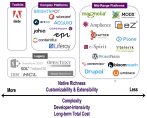Special challenges of managing school websites
Today I spent a delightful morning with 75 web managers from "K-12" (i.e., primary and secondary) school districts around the U.S. at the first annual "Education Web Professionals National Conference." It was quite interesting to hear how their needs differ from web managers in, say, higher education. Some observations in no particular order:
When every school in a district has its own website, and in many cases teachers can operate their own sub-sites, then multi-site management becomes a very, very big deal. As Web CMS Report readers know, effective multi-site management is a key gating feature that tends to separate less expensive from pricier products (though not all pricey products do it well!). Not surprisingly, most Web CMS projects in this space have begun as experimental Intranet implementations. Most public sites get managed manually.
Not surprisingly, web teams strapped for funding have great interest in open source, but even a simpler package like Joomla! can seem complicated to non-technical webmasters (and it won't effectively manage multiple sites). Like many government agencies, some school districts are longer on staff than discretionary funds, but the extent of their technical resources varies widely. I met some specialists from one of the wealthiest counties in the country who had an enviable technology testing lab, and then two minutes later chatted with a staffer from a small rural county who wanted to make more use of his PHP background, but spent most of his days putting out fires as the sole webmaster for the school district.
In general, districts make available more resources and attention for instructional technologies than school websites. Many districts license commercial learning content management systems (LCMS) like BlackBoard. But the open source LCMS Moodle is rapidly gaining in popularity. Some schools are stretching Moodle a bit to serve as a kind of Intranet portal and internal "Web 2.0" platform, even though that isn't what Moodle's really intended to do.
As in other sectors, most Web 2.0 initiatives (especially blogs) remain mostly behind the firewall. One school district superintendent wanted to blog publicly, but was shot down by her legal counsel, who pointed out that everything she wrote publicly became official policy and carried legal weight. No personal opinions. Too bad.
On the other hand there is great potential in podcasting, whatever the pedagogic (and production) challenges. One ambitious district figured out how to develop inventive podcasts in areas where their high school students were under-performing. The podcasts apparently became something of an underground hit, with students listening to them in the privacy of their own MP3 players, where no one could accuse them of being "uncool."
Parents often have higher expectations for school websites than the schools themselves. Central district web leaders use parental surveys and focus groups to leverage standardization measures across tiers and schools. Calendars are the #1 requested parental resource. Sports information and stats are another popular area. Parents frequently ask for printable, high-res photos of their little darlings after they appear on a school website (one district pays "Smugmug" $45 a year to handle this for them).
However, one school district manager observed that parental focus groups tend to be dominated by power-volunteers, who often are not power web users. But then more sophisticated parents complain when website redesigns end up insufficiently modern/functional. Hard to know how much of that was a stereotype. But student reactions were almost universally predictable: "the site sucks."
E-mail remains the most predominant electronic info distribution method, far dwarfing RSS. But school districts have also learned to carefully meter the frequency of these communications (lest parents opt out amid the flood of other mail they get), as well as carefully monitor them for editorial content. Suggests to me that integrated e-mail campaigns must be a more important requirement for CMS buyers in this community. Still, one web manager had mixed feelings about these blasts: "We're training parents to be passive," she argued.
If you're in the school website business, I encourage you to check out the nascent group that's forming here.








